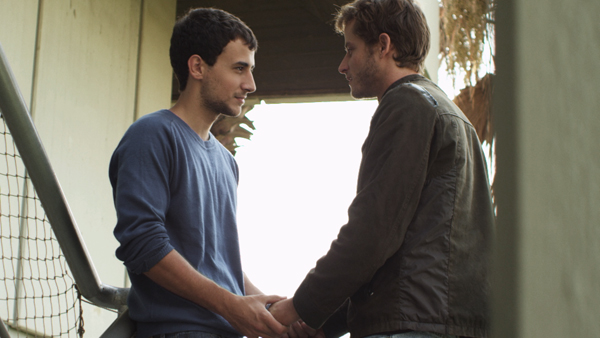Out in the Dark takes an intensely intimate look beyond the familiar tragic premise of Romeo and Juliet across the Israeli/Palestinian wall. A similar star-crossed Romeo-and-Romeo romance has been broached before in Eytan Fox’s more superficial The Bubble (2007). Here, debut director Michael Mayer, with co-scripter Yael Shafrir, gives the handsome male lovers liberating lives, though made more complicated by political and family restrictions.
Opening at night, and continuing in the dark almost throughout, Nimr Mashrawi (newcomer Nicholas Jacob) scrambles past border security to get from his family’s Ramallah home on the West Bank to a Tel Aviv gay night club, where young Palestinian men can hang out and flirt with Israelis as if they were in any cosmopolitan city. Over drinks, he tells Roy Schaefer (Michael Aloni, a TV teen heartthrob in Israel) about his hopes to continue his graduate studies in psychology abroad, and the sparks fly between them.
Back home, over the objections of his militant brother, Nabil (Jameel Khouri), Nimr is excited to have a temporary pass for an internship where he feels he’s a helpful part of a Tel Aviv clinic’s social services staff on how to treat Palestinian patients. He stays overnight with other gay Palestinian guys, who live illegally on a roof. This gives Nimr a chance to meet up again with “that cute lawyer,” as his flamboyant friend Mustafa (Loai Noufi) well describes him. And they quickly fall into bed together with sweaty romantic passion.
Nimr manages to arrive home safely this time (some scenes were filmed in Ramallah), albeit facing relentless verbal criticism from his family that his work amounts to collaboration; his brother respects that “God put a good head on your shoulders,” yet insists he should get a scholarship abroad instead. (Nabil hides guns for an attack.)
Meanwhile, Nimr’s friend Mustafa faces violence from vicious security officer Gil (Alon Pdut), who gives him an ultimatum that’s something of a Catch-22: cooperate as an informant on Palestinian terrorists or his conservative Muslim family will be informed that he’s a homosexual prostitute. (The filmmakers conducted background research on LGBT Palestinians living in fraught limbo in Israel for the touches of verisimilitude.) Roy is sure that he can protect Nimr from such threats by keeping him at his nice apartment, having a romantic interlude at his old swimming pool, and taking him for Shabbat dinner at his parents, though they haven’t fully accepted their son’s orientation. As family and security pressures intensify on both sides, Roy is confident his father’s legal connections with underworld figures (the corruption angle is a fresh plot point) can get Nimr a permanent pass.
Cinematographer Ron Aviad changes the tone from the intimacy of falling in love to the tensions of a thriller, with a lot of hand-held chase scenes down narrow alleys, fleeing macho Israeli and Palestinian homophobes, both equally brutal. The look of the film helps overcome some stereotypes—Nimr is a bit too much of an old-fashioned Guess Who’s Coming to Dinner-like dream date and his brother is all anger. Suspense thrillingly builds as to what options the lovers have, what choices they will want to make, and which they will be able to take, leaving glimpses of romantic optimism a la “There’s a place for us….”







Leave A Comment